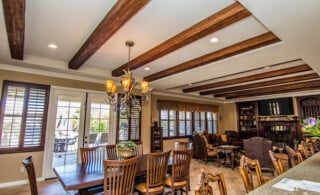 Photo: Emilija Randjelovic / iStock / Getty Images
Photo: Emilija Randjelovic / iStock / Getty Images
Nothing ties a room together like a warm, cozy fireplace. But what are your options if your home doesn’t already have a chimney? You could consider adding either an electric or gas fireplace. Both have their advantages and disadvantages, so we’ll break down everything you need to know about electric versus gas fireplaces.
This guide will explore the biggest factors to consider when choosing between a gas or electric fireplace for your home. Read on to learn more about the costs of electric and gas fireplaces, and how both options compare with installation, maintenance, energy efficiency, safety, heating capacity, and aesthetics.
 Photos: AleksandarNakic / iStock / Getty Images Plus / Getty Images, pashapixel / iStock / Getty Images Plus / Getty Images, YvanDube / iStock / Getty Images Plus / Getty Images
Photos: AleksandarNakic / iStock / Getty Images Plus / Getty Images, pashapixel / iStock / Getty Images Plus / Getty Images, YvanDube / iStock / Getty Images Plus / Getty Images
How Expensive Are Gas vs. Electric Fireplaces?
Cost is likely a top consideration when choosing between a gas and an electric fireplace.
Gas fireplaces have more options available, but they tend to be pricier to install than electric fireplaces.
Operating costs vary depending on the unit’s size, model, and the cost of fuel in your area. Gas tends to be more affordable than electricity; however, a general rule of thumb is the more British thermal units (BTUs) your fireplace releases, the more it costs to run.
Even if the fuel they use is less expensive, gas fireplaces usually emit more BTUs than electric fireplaces (i.e., use more energy). They generally have higher operating costs as a result.
Gas Fireplace Costs
Gas fireplace units typically cost between $2,000 to $7,500. There are several gas fireplace styles with different price ranges:
- Ducted gas fireplaces cost around $2,000 on average.
- Ventless gas fireplaces typically cost $2,300 to $3,500 but can reach $6,000.
- Gel-powered ventless fireplaces cost $300 to $700.
- Direct vent gas fireplaces cost $3,500 to $7,500.
Professionally installing a gas fireplace costs $2,300 to $10,000, depending on the unit’s style and location in the home.
Costs associated with running a gas fireplace include:
- Cost of propane
- Cost of natural gas
- Cost of ventless gas logs
Electric Fireplace Costs
Electric fireplaces cost between $250 to $6,200 for the unit and installation, depending on the type:
- Freestanding electric fireplaces cost $250 to $650.
- Dual-sided electric fireplaces can cost up to $6,200.
Installing an electric fireplace costs $150 to $300 on average, but you may also have to pay for wiring installation.
Costs associated with running an electric fireplace include:
- Cost of electricity
- Possibly installing a dedicated 120-volt outlet near the fireplace
Which Fireplace Is Easiest to Install?
 Photo: spates / iStock / Getty Images Plus / Getty Images
Photo: spates / iStock / Getty Images Plus / Getty Images
Both electric and gas fireplaces are easier to install than traditional wood-burning fireplaces. Yet, when comparing gas versus electric fireplaces, the latter option stands out for its simple installation.
Gas Fireplace Installation
You can install a gas fireplace in nearly any room with a few simple steps:
- Cutting out an area for the fireplace to be installed
- Running electricity and gas lines to the fireplace
- Building a fireplace vent leading outside your home (unless it’s a ventless gas model)
- Installing a mantel
If you have sufficient DIY experience, you may be able to install a gas fireplace yourself. However, when working with electricity or natural gas, it’s safer to find a local fireplace contractor to help with installation.
Electric Fireplace Installation
For many electric fireplaces, installation is as simple as plugging the unit into an outlet and turning it on.
Some other steps that may be involved:
- Cutting out an area for the fireplace to be installed
- Wiring the unit
- Installing the mantel
- Installing a dedicated outlet near the fireplace
Electric fireplaces are more DIY-friendly for installation. However, if electrical work is involved, you may want to consider hiring a local professional for help.
Which Fireplace Is Easiest to Maintain?
If you’re not a fan of fireplace maintenance, electric and gas fireplaces are great options for you. Both require little to no maintenance, but there are a few considerations.
Gas Fireplace Maintenance
Gas fireplaces are lower-maintenance than wood-burning fireplaces but will require some attention annually.
Maintenance tasks:
- Inspect and clean the vent and/or flue
- Check gas valves for leaks
If your flue is damaged, you can find fireplace flue repair contractors near you for assistance.
Electric Fireplace Maintenance
You won’t have to worry much about the maintenance after installing an electric fireplace.
Maintenance tasks:
- Replace burnt-out bulbs
- Inspect wiring
Which Fireplace Is Most Energy-Efficient?
Gas and electric fireplaces tend to be far more efficient than wood-burning units at converting energy to heat. They also use cleaner sources of energy so they don’t produce as many harmful emissions.
Gas Fireplace Energy Efficiency
Gas fireplaces are very energy-efficient and clean-burning. Ventless gas fireplaces, for example, burn at an optimum temperature to minimize carbon monoxide gas and moisture production.
Unit efficiency varies depending on the model and your home’s insulation, but gas fireplaces generally convert energy to heat at around 70% to 90% efficiency.
- Clean-burning
- Convert most energy into heat
Electric Fireplace Energy Efficiency
Electric fireplaces generally do not waste energy and use less energy than gas units overall. Because they don’t burn fuel, they also don’t release particles into the atmosphere while they operate.
However, you may need to run a secondary heat source due to its lower heating capacity.
- Convert nearly all electricity to heat
- May require a secondary heat source
Which Fireplace Is Safest?
Gas and electric fireplaces are potential fire hazards because they produce heat. Both units are quite safe, but here are a few safety considerations.
Gas Fireplace Safety
These units produce noxious fumes like carbon monoxide if they’re faulty, improperly installed, or improperly maintained. Hiring a local fireplace installation expert should help mitigate that risk.
Some other safety concerns include:
- Glass doors become hot to touch
- Can cause moisture buildup if they vent directly into the home
Electric Fireplace Safety
Since these units heat with electricity and do not require a ventilation system, there’s no risk of harmful emissions.
The biggest safety concern:
- Risk of electrical fire if the wiring becomes damaged
Do Gas or Electric Fireplaces Heat Quicker?
 Photo: Yana Dzubiankova / iStock / Getty Images Plus / Getty Images
Photo: Yana Dzubiankova / iStock / Getty Images Plus / Getty Images
Electric heaters and gas fireplaces both produce heat immediately once activated. However, gas fireplaces tend to be better than electric units for heating larger rooms because of their higher heating capacity.
You may also feel gas heat more quickly than electric heat if you’re standing further away in a room.
Here’s how gas and electric fireplaces compare:
- Gas fireplaces typically produce between 7,000 to 40,000 BTUs depending on the size and model of the unit.
- Electric fireplaces usually run on 120 volts of electricity and emit between 4,000 to 5,000 BTUs.
Electric vs. Gas Fireplace: Which Looks Best?
There are plenty of gas and electric fireplace units that make beautiful additions to any room. However, which looks better depends on your preference for real flames.
Gas fireplaces replicate the ambiance of a campfire or wood-burning fireplace because they produce a flame and emit more intense heat.
Instead of flames, electric heater fireplaces project an image of a burning log. Some models also include sound effects that mimic a crackling fire.
Will Adding a Fireplace Increase My Home’s Value?
Adding an aesthetically pleasing fireplace can add to the resale value of your home. Gas fireplaces are better for heating and generating authentic flames, which may be more appealing to homebuyers than plug-in electric fireplaces. Since electric fireplaces aren’t permanent fixtures, they won’t create as much standalone value as a gas fireplace installation.
If you’re still not sure about which fireplace is best for you, you can always find the best local professionals in your area to get an expert’s advice. Once you’ve identified the perfect fireplace in your home, be sure to find fire sprinkler contractors near you to ensure your home has adequate fire protection measures.
 Room Dividers and Partitions
Room Dividers and Partitions  Speaking the Language of Home Accents
Speaking the Language of Home Accents  Decorating with Wood Beams
Decorating with Wood Beams  The Dish on Dining Room Decorating
The Dish on Dining Room Decorating  Wrought Iron Installations Beautify Your Home
Wrought Iron Installations Beautify Your Home 

Are You Familiar With This Topic? Share Your Experience.